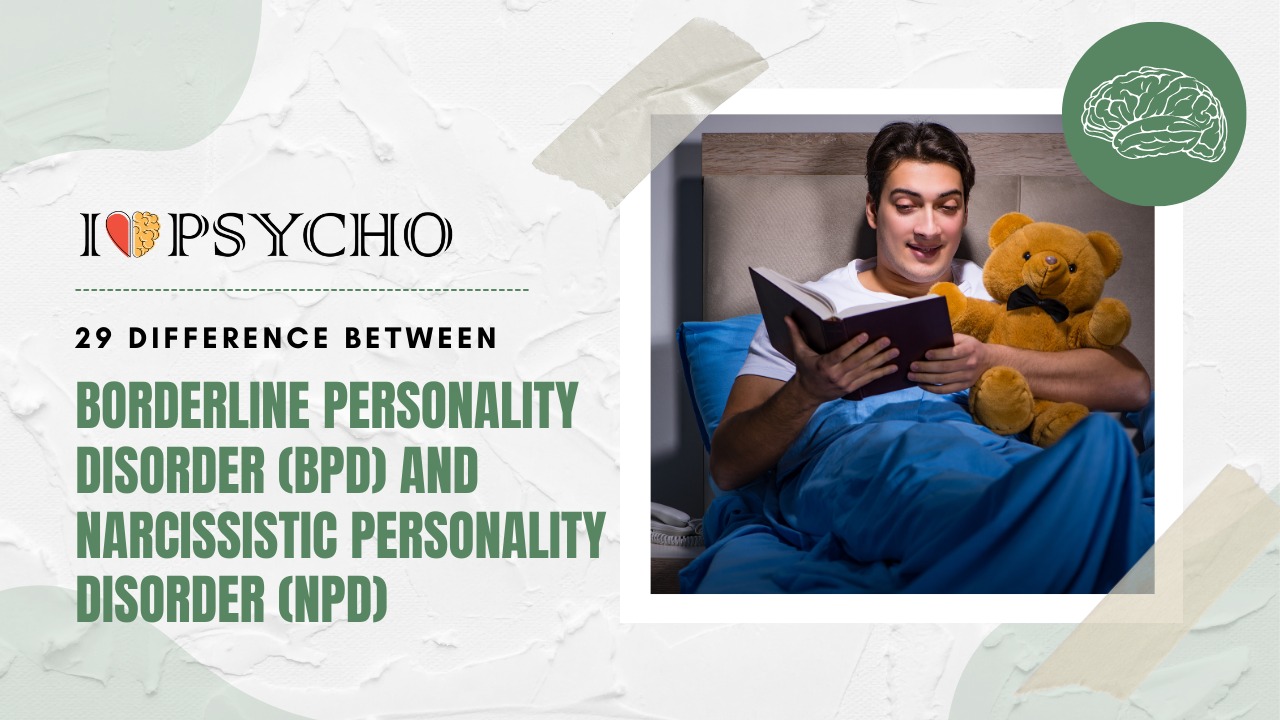BPD and NPD are mental illnesses, although they affect people differently. Despite their similarities, they are significantly distinct. BPD affects emotions, interactions, and self-image. BPD sufferers experience rapid mood fluctuations. This causes emotional instability. They don’t know who they are and go between believing themselves as flawless and criticizing others. Relationships are problematic and self-harm or drug use may occur due to the dread of being alone. NPD’s entitlement and self-importance are excessive. NPD sufferers want approval, don’t care about others, and use them. Their self-esteem depends on others.
Both disorders process emotions differently. BPD sufferers struggle to manage powerful emotions. They get furious, depressed, and nervous rapidly. However, NPD sufferers cover their insecurities by becoming grandiose.
Relationships differ between BPD and NPD. BPD sufferers fear being alone and have a fluid self-image, making solid relationships difficult. Strong but fragile connections result. However, because they lack social reciprocity, people with NPD utilize others to satisfy their own needs.
BPD and NPD cognitive centers vary. BPD sufferers exhibit detachment, paranoia, and problems thinking. Self-perception changes. NPD sufferers have a solid but inflated self-image. They reject criticism and degrade others to maintain their dominance.
BPD and NPD treatment varies. Dialectical behavior therapy (DBT) helps many BPD patients manage their emotions and get along with others. However, NPD is difficult to cure since the person won’t accept fault. Psychotherapy can assist with deep-seated anxieties and understanding, but not always.
BPD and NPD are distinct mental diseases with considerable overlap. BPD has emotional instability, fear of being alone, and irresponsible conduct, whereas NPD has an inflated sense of self, a lack of empathy, and a need to be adored. Knowing how these conditions vary helps diagnose and treat them.
Also Read: What is The Experimental Method and How Does It Work?
|
S.No. |
Aspect |
Borderline Personality Disorder (BPD) |
Narcissistic Personality Disorder (NPD) |
|
1. |
Core Traits |
Emotional dysregulation, unstable identity, self-harm |
Grandiosity, lack of empathy, entitlement |
|
2. |
Self-Image |
Unstable self-concept |
Inflated self-concept |
|
3. |
Emotional Intensity |
Intense and rapidly shifting emotions |
Often superficial or lack of depth |
|
4. |
Fear of Abandonment |
Often present, leading to clinginess or rejection sensitivity |
Less central, less likely to fear abandonment |
|
5. |
Interpersonal Relationships |
Intense but unstable relationships |
Exploitative, self-serving relationships |
|
6. |
Empathy |
Often high empathy despite emotional struggles |
Lack of empathy, self-centeredness |
|
7. |
Emotional Lability |
Pronounced mood swings |
More stable mood unless threatened |
|
8. |
Identity Disturbance |
Frequently seen, unstable sense of self |
Strong sense of self, may be rigid |
|
9. |
Fear of Rejection |
Often present, can lead to relationship issues |
Not central, may not impact relationships |
|
10. |
Grandiosity |
Not a core feature |
Central, often shows as grandiose behavior |
|
11. |
Self-Harm or Suicidal Behaviors |
Often present, particularly during distress |
Uncommon, not driven by emotional distress |
|
12. |
Manipulative Behavior |
May use manipulation to manage emotions |
Manipulation for personal gain |
|
13. |
Self-Esteem |
Often low, fluctuates |
Inflated self-esteem |
|
14. |
Idealization and Devaluation |
Frequent idealization and devaluation of others |
Not a core feature |
|
15. |
Attachment Patterns |
Often preoccupied or fearful attachment |
Often dismissive or avoidant attachment |
|
16. |
Criticism and Feedback |
May lead to intense emotional reactions |
Often rejected or reacted defensively |
|
17. |
Need for Attention |
May seek attention for emotional validation |
Requires admiration and attention |
|
18. |
Identity vs. Superiority |
Identity instability is more prominent |
Superiority and need for admiration |
|
19. |
Emotional Vulnerability |
Less prone to emotional vulnerability |
|
|
20. |
Self-Destructive Behaviors |
Common, often as a coping mechanism |
Rare, driven by maintaining self-image |
|
21. |
Core Focus of Relationships |
Intense emotional connection and fear of abandonment |
Seeking admiration and validation |
|
22. |
Emotional Regulation Strategies |
Often maladaptive, such as self-harm or impulsive behaviors |
May suppress emotions or manipulate |
|
23. |
Self-Perception |
Often negative and self-critical |
Inflated and grandiose self-perception |
|
24. |
Emotional Reactivity |
Highly reactive, strong emotional responses |
Less reactive, more controlled emotions |
|
25. |
Splitting |
Common, characterized by black-and-white thinking |
Less common, sees people as all good or all bad |
|
26. |
Need for Control |
Often present due to fear of abandonment |
Need for control and recognition |
|
27. |
Therapy Focus |
Emotion regulation, coping skills |
Addressing entitlement and lack of empathy |
|
28. |
Core Emotion |
Intense fear of abandonment or rejection |
Often resentment or superiority |
|
29. |
Self-Identity |
Unstable and shifting |
Often rigid, strong self-identity |
Also Read: The History and Career Opportunities of Forensic Psychology
Frequently Asked Questions (FAQs)
Q.2: What are the key differences between Borderline Personality Disorder (BPD) and Narcissistic Personality Disorder (NPD)?
BPD has emotional instability, mood swings, and self-identity challenges. BPD sufferers dread abandonment and self-destruct. However, NPD is characterized by self-importance, a lack of empathy, and a desire for adulation.
Q.3: Can Borderline Personality Disorder (BPD) and Narcissistic Personality Disorder (NPD) coexist in the same individual?
Personality disorders can overlap, thus people can have both. To effectively identify and distinguish the two diseases, a mental health expert must conduct a full examination. Traits and symptoms would determine treatment.
Q. 4: How is BPD and NPD treated?
DBT helps BPD patients gain emotional control, distress tolerance, and social skills. Due to the patient’s denial, NPD treatment is harder. Psychotherapy can address fears and promote empathy, but it may be harder to cure NPD.
Q.5: Are Borderline Personality Disorder (BPD) and Narcissistic Personality Disorder (NPD) lifelong conditions?
BPD and NPD are persistent, however, symptoms can change with therapy. BPD patients may improve with therapy and coping skills. However, NPD’s intrinsic character and the individual’s reluctance to admit fault might make it harder to alter. Early intervention and persistent therapy can improve symptoms for both diseases.









